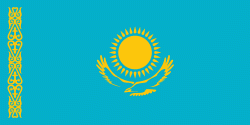Kazakhstani tenge
₸
The tenge ( or ; теңге, teñge, ; sign: ₸ ; code: KZT) is the currency of Kazakhstan. It is divided into 100 tiyn (тиын, tıyın also transliterated as tiyin).After the breakup of the Soviet Union in December 1991, most of the formerly Soviet republics attempted to maintain a common currency. Some politicians hoped to at least maintain "special relations" among former Soviet republics (the "near abroad"). Other reasons were the economic considerations for maintaining the rouble zone. The wish to preserve strong trade relations between former Soviet republics was considered the most important goal.
The break-up of the Soviet Union was not accompanied by any formal changes in monetary arrangements. The Central Bank of Russia was authorized to take over the State Bank of the USSR (Gosbank) on 1 January 1992. It continued to ship Soviet notes and coins to the central banks of the eleven newly independent countries, which had formerly been the main branches of Gosbank in the republics.
The political situation, however, was not favourable for maintaining a common currency. Maintaining a common currency requires a strong political consensus in respect to monetary and fiscal targets, a common institution in charge of implementing these targets, and some minimum of common legislation (concerning the banking and foreign-exchange regulations). These conditions were far from being met amidst the turbulent economic and political situation.
During the first half of 1992, a monetary union with 15 independent states all using the rouble existed. Since it was clear that the situation would not last, each of them was using its position as "free-riders" to issue huge amounts of money in the form of credit. As a result, some countries were issuing coupons in order to "protect" their markets from buyers from other states. The Russian central bank responded in July 1992 by setting up restrictions to the flow of credit between Russia and other states. The final collapse of the rouble zone began when Russia pulled out with the exchange of banknotes by the Central Bank of Russia on Russian territory at the end of July 1993.
As a result, Kazakhstan and other countries still in the rouble zone were "pushed out". On November 12, 1993, the President of Kazakhstan issued a decree "On introducing national currency of Republic of Kazakhstan". The tenge was introduced on 15 November 1993 to replace Soviet currency at a rate of T 1 = Rbls 500. In 1991 a "special group" of designers was set up: Mendybay Alin, Timur Suleymenov, Asimsaly Duzelkhanov and Khayrulla Gabzhalilov. Thus November 15 is celebrated as the "Day of National Currency of Republic of Kazakhstan". In 1995 a tenge-printing factory opened in Kazakhstan. The first consignment of tenge banknotes were printed in the United Kingdom and the first coins were struck in Germany. In February 2019, Kazakh President Nursultan Nazarbayev signed a bill into law that will remove all Russian captions from future tenge banknotes and coins.
Country
-
Kazakhstan
Kazakhstan, officially the Republic of Kazakhstan, is a transcontinental country located mainly in Central Asia and partly in Eastern Europe. It borders Russia to the north and west, China to the east, Kyrgyzstan to the southeast, Uzbekistan to the south, and Turkmenistan to the southwest, with a coastline along the Caspian Sea. Its capital is Astana, known as Nur-Sultan from 2019 to 2022. Almaty, Kazakhstan's largest city, was the country's capital until 1997. Kazakhstan is the world's largest landlocked country, the largest and northernmost Muslim-majority country by land area, and the ninth-largest country in the world. It has a population of 19 million people, and one of the lowest population densities in the world, at fewer than 6 people per square kilometre (15 people per square mile).
The country dominates Central Asia economically and politically, generating 60 percent of the region's GDP, primarily through its oil and gas industry; it also has vast mineral resources. Officially, it is a democratic, secular, unitary, constitutional republic with a diverse cultural heritage, and has the highest Human Development Index ranking in the region. Kazakhstan is a member state of the United Nations, World Trade Organization, Commonwealth of Independent States, Shanghai Cooperation Organisation, Eurasian Economic Union, Collective Security Treaty Organization, Organization for Security and Cooperation in Europe, Organization of Islamic Cooperation, Organization of Turkic States, and International Organization of Turkic Culture.
